(อ่านภาษาไทยด้านล่าง)
March is an important month, marked by International Women’s Day on the 8th, a day rooted in the fight for working women’s rights. As we are committed to empowering women and advancing gender equality, JELI sees this as a time to reflect on the struggles and sacrifices of those who paved the way for the rights and protections we have today.
However, this March has also been a difficult one. The earthquake on the 28th was felt across most of Thailand, disrupting livelihoods and adding to the challenges many communities already face. The tragic collapse of a construction site in Bangkok has taken the lives of workers while leaving many others injured or trapped. We send our heartfelt condolences to those affected and their loved ones. This heartbreaking event is a reminder of the stronger enforcement of workplace safety standards and protections, particularly in high-risk sectors like construction.
This month, we continue our work, joining fellow women activists in discussions on fair economic policies and engaging in in-depth talks with female rider leaders. We invite you to pay tribute to the history of the struggle of working women and acknowledge the ongoing fight for equity. Explore global efforts to achieve justice for women in this newsletter.
Our Work This Month
International Women’s Day Panel Discussion: “State Economic Policies: Leaving Working Women and Children Behind”
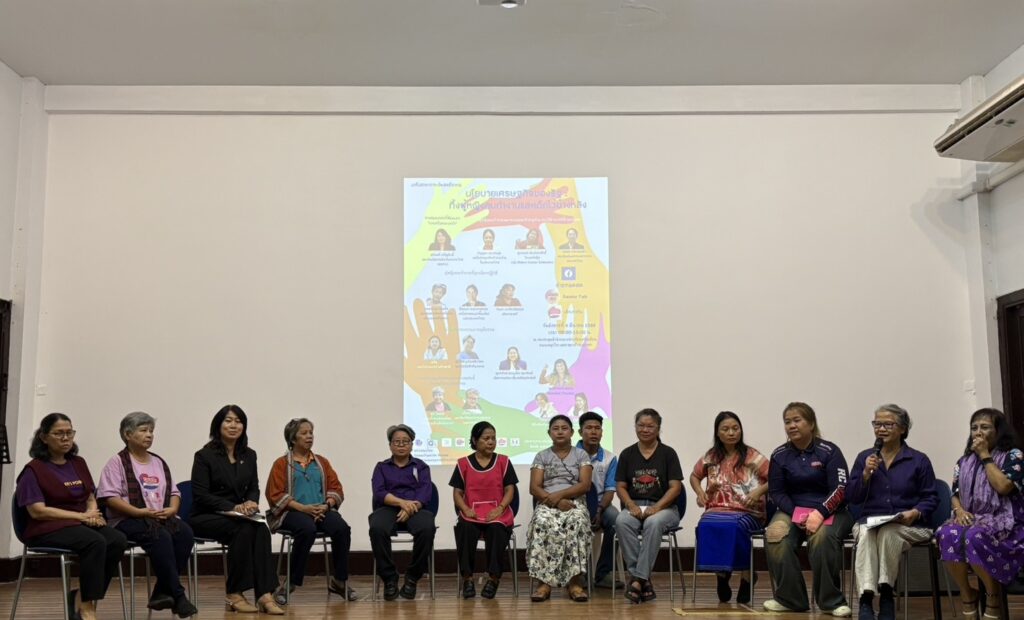
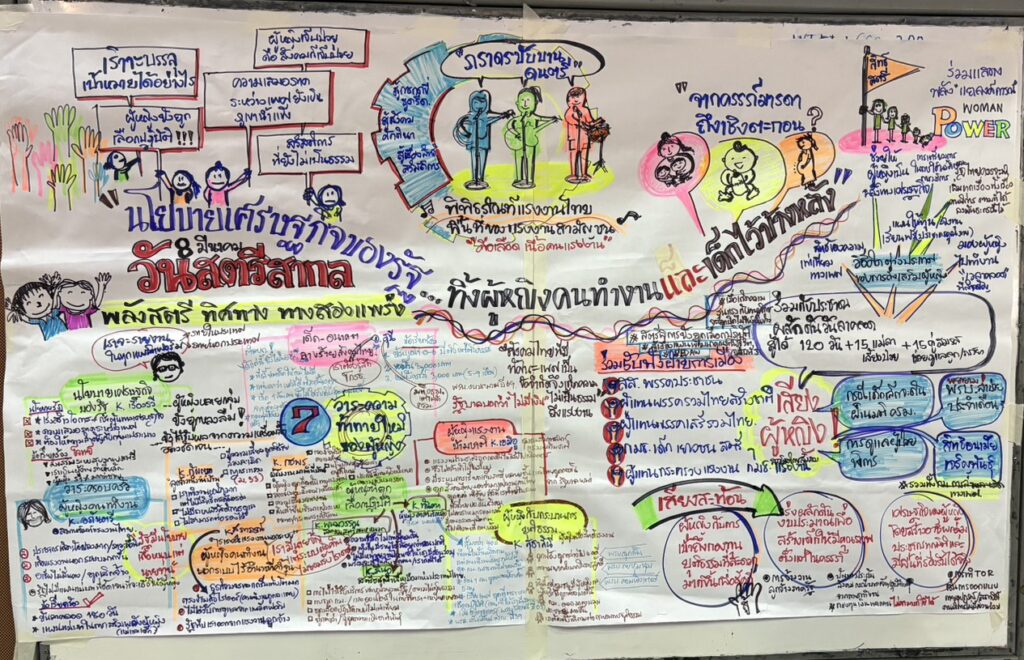
On March 4, 2025, JELI officers, along with Supaporn Panprasit, admin of the Rider Center group, and Rungniran Khamphitoon, a representative of the Care Workers Cooperative, participated in a panel discussion for International Women’s Day. The discussion, titled “State Economic Policies: Leaving Working Women and Children Behind”, took place at the Student Christian Center in Bangkok.
This forum was held in recognition of International Women’s Day, observed annually on March 8. It brought together civil society networks advocating for women, labor, and children to discuss and raise awareness of the challenges faced by working women. Issues addressed included the state’s lack of investment in children, discrimination, barriers to accessing justice, and the lack of social protection for informal workers, platform workers, and domestic workers.
Supaporn Panprasit, admin of the Rider Center group, spoke as a female rider and platform worker. She pointed out that platform workers are labeled as “independent contractors,” meaning they are not classified as employees and therefore lack benefits such as social protections and compensation funds. She emphasized that the relationship between platforms and riders clearly resembles an employer-employee dynamic, yet both platforms and the government avoid recognizing riders as employees, leaving them in a vulnerable position. Furthermore, the Ministry of Labor has been pushing for the draft Independent Workers Promotion and Protection Act, which classifies riders under this category. If passed, this law would exclude riders from labor law protections and prevent them from enrolling in Social Security under Section 33 or accessing the Workmen’s Compensation Fund. Therefore, rider groups strongly oppose this draft law and call for public support.
The discussion also provided a platform to exchange views on ongoing struggles in the women’s movement, including government budget allocations that fail to address issues affecting women and children, as well as local administrative challenges. Key demands from women’s groups included 180 days of maternity leave, increased budget support for mothers and children, employment conditions that enable family-building, quality-of-life improvements for women with disabilities, and equal rights for indigenous women. The event concluded with participants collectively reading a statement addressed to the government in recognition of International Women’s Day 2025.
Read the International Women’s Day 2025 statement by the network of working women and children HERE.
JELI joined labor networks and insured persons in calling for better Social Security
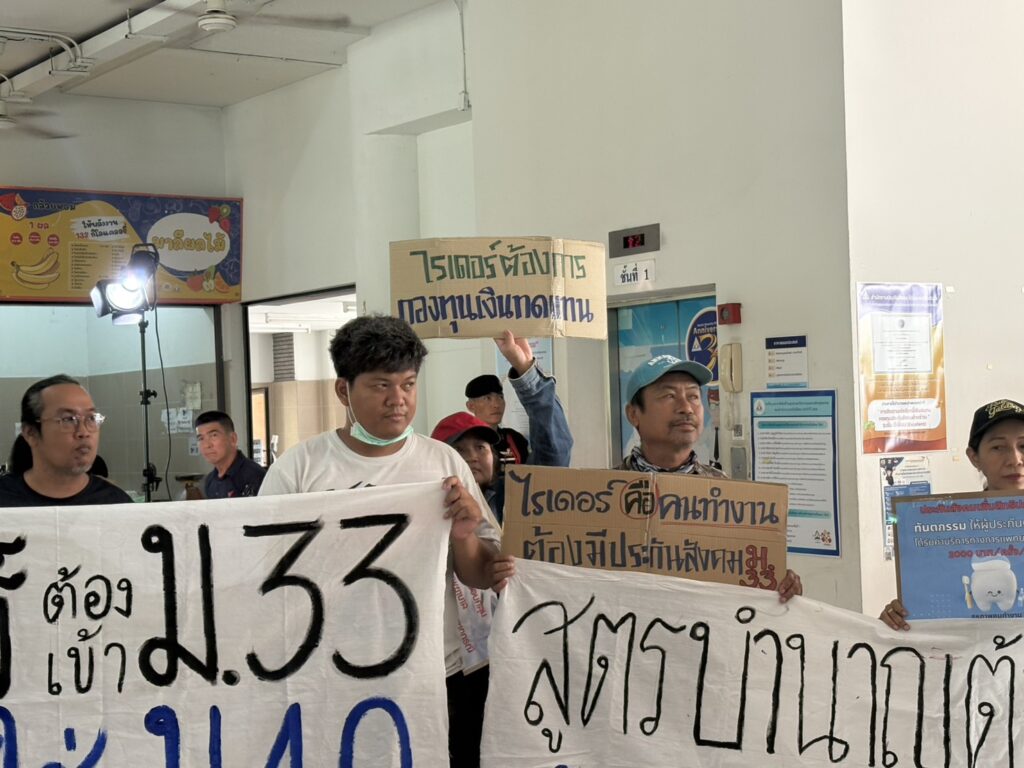
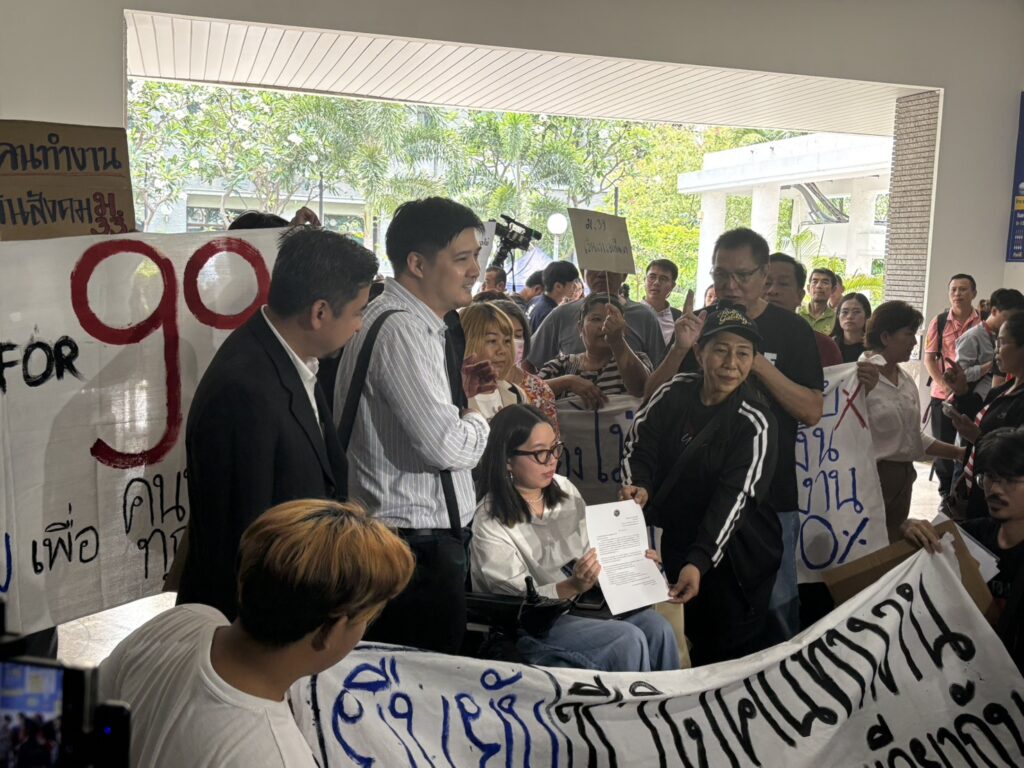
On March 11, 2025, JELI officers, along with labor networks and insured persons under the social security system, gathered at the Social Security Headquarters in Nonthaburi to follow up on the social security board meeting. A key agenda item was the calculation of the new pension formula for insured persons. This issue arose because individuals insured under Section 39, who had previously been under Section 33, were adversely affected by an unfair formula that resulted in them receiving a pension lower than what they should have.
This gathering, in addition to waiting for the outcome of the agenda, also included speeches from labor network groups addressing various issues related to social security rights and the management of the Social Security Office. Many labor groups are calling for the reform of the Social Security Fund into a public organization that is transparent, open, and accountable. They also demand that social security benefits be appropriate and genuinely meet the needs of insured persons. Furthermore, the rider and platform worker groups are advocating for access to Social Security benefits under Section 33, with employers being jointly responsible, and for the Workmen’s Compensation Fund to assist riders who suffer accidents or fatalities while working.
JELI discussed with the female rider leaders on the draft Independent Workers Promotion and Protection Act
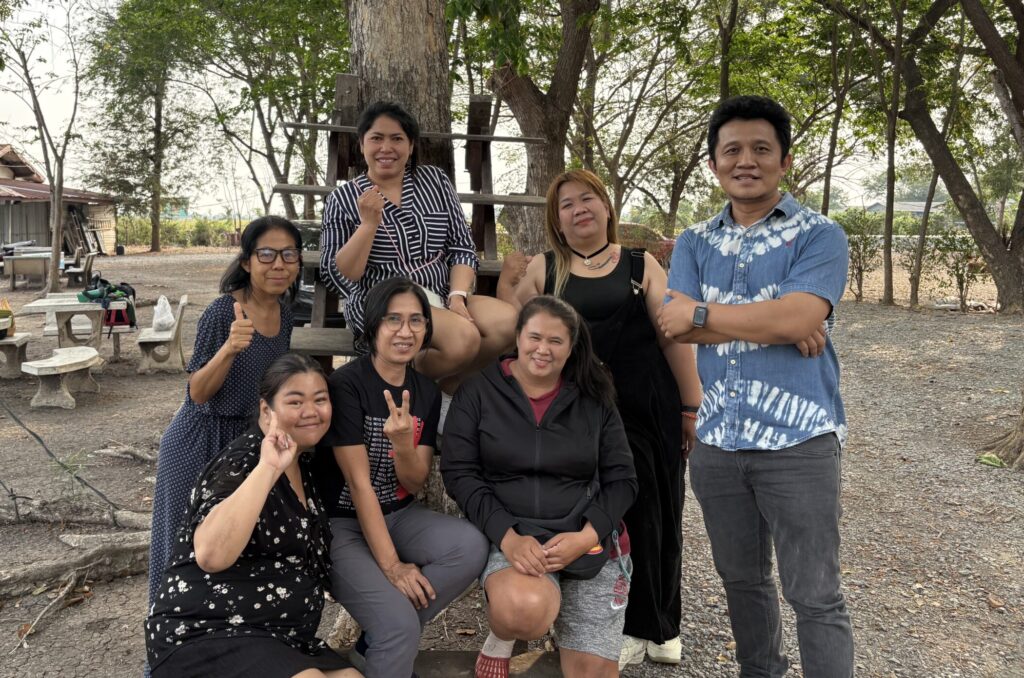
On March 19, 2025, JELI officers met with four female rider leaders from the Rider Center, representing several areas in Bangkok, to discuss and gather feedback on the draft Independent Workers Promotion and Protection Act. This law, which is being pushed by the Ministry of Labor, will directly impact riders nationwide.
The rider leaders discussed the uncertainties surrounding the draft law, particularly its vague definition of semi-independent workers and the lack of genuine promotion of negotiation systems. The discussion concluded that the draft law does not adequately protect riders and would close off opportunities for riders to claim the rights they are entitled to. If passed, this law would confirm that riders are not “employees” of the platforms but are merely independent workers. As a result, riders would lose the ability to negotiate with platforms over working conditions, pay, or benefits. Additionally, they would not have access to social security benefits under section 33 or the Workmen’s Compensation Fund. The rider leaders will share this information with their fellow members to raise awareness and come to a consensus on how to continue opposing the draft bill.
Sharing Experiences: Enhancing Skills and Expertise in Thai Massage
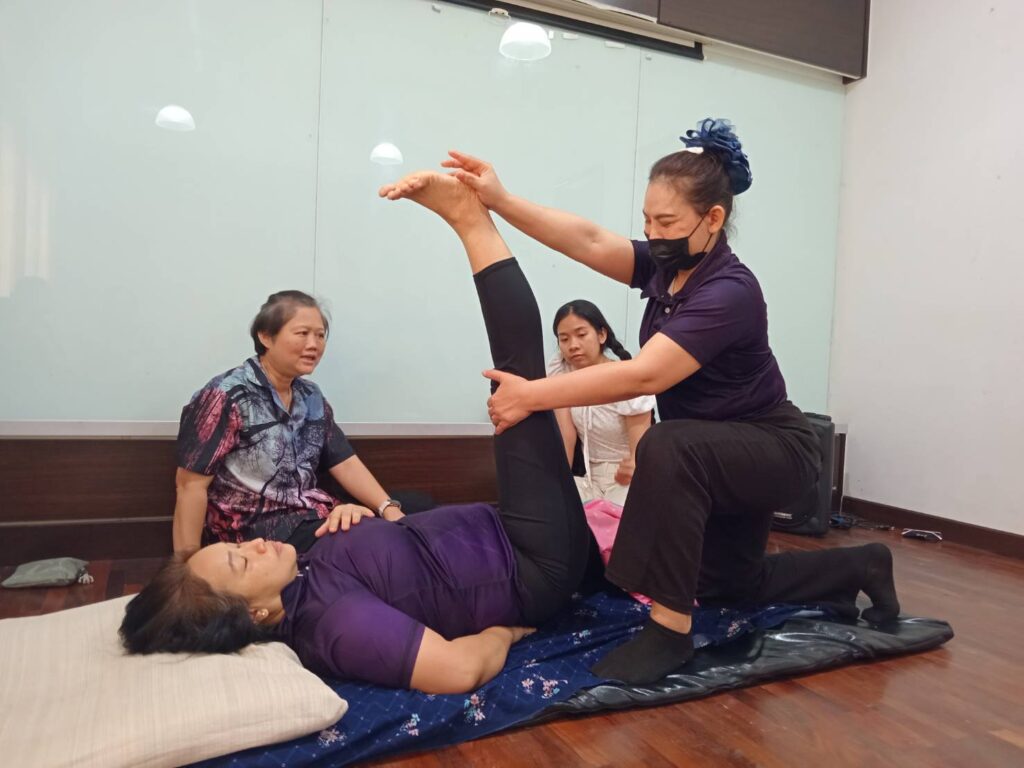
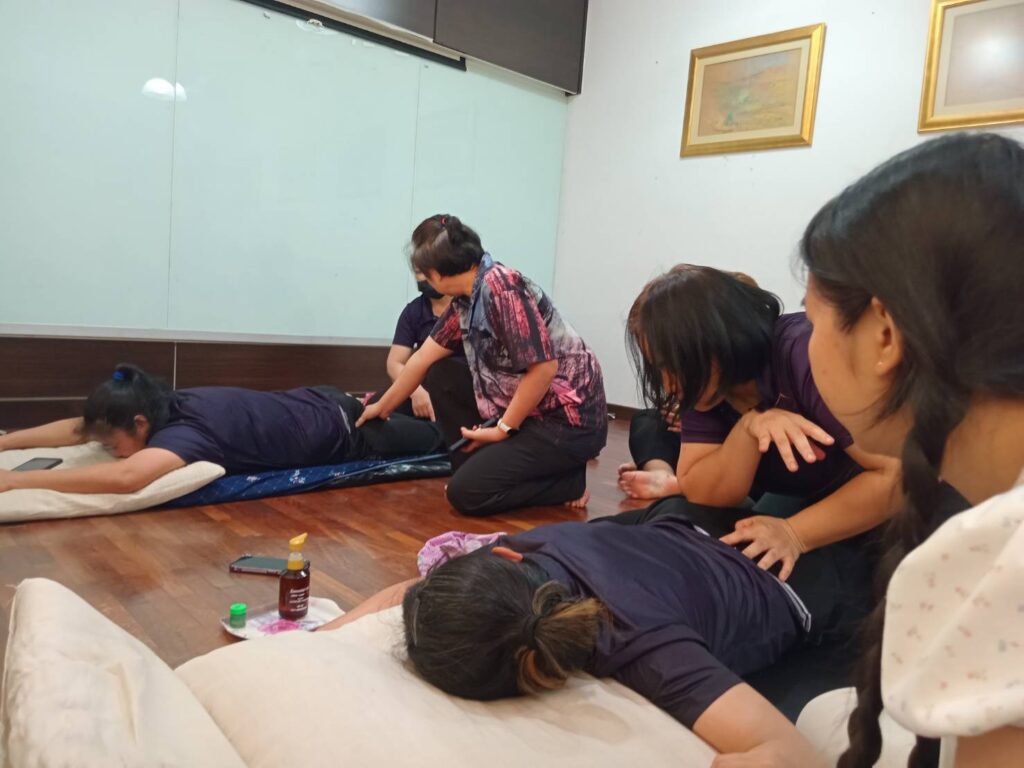
On March 24, 2025, JELI officers joined an experience-sharing event held by the Massage Therapist Cooperative “Thai Therapy Spa at Home” to enhance skills among its members. The purpose of this event was to allow massage therapists to share their experiences and techniques to improve their expertise in massage.
Yok, one of the leaders and co-founders of the Massage Therapist Cooperative, shared with her colleagues that the principles of Thai massage must prioritize the safety of the clients. Massage therapists should always ask clients before each session whether they have any medical conditions. Certain medical conditions, such as strokes, psoriasis vulgaris, dermatophytosis, tuberculosis, cancer, and diabetes, are contraindications for massage. Those who have recently undergone surgery or have not fully healed from accidents and still have open wounds also should not receive a massage.
Recently, there has been an increasing demand for massage services among pregnant women. “Dee,” a key organizer and former physical therapist at a hospital, explained that prenatal massage is possible but requires caution. Certain areas, such as the soles of the feet—where various organs are connected—should be avoided, as well as pressure points on the inner thighs that regulate energy flow. Prenatal massage primarily focuses on physical and emotional relaxation, as pregnant women often experience heightened sensitivity and anxiety about their pregnancy.
In addition, massage therapists must not only be knowledgeable and skilled in their craft, but they also need to have appropriate techniques and methods tailored to the health and needs of their clients. Massage therapists must possess strong psychological skills as well, maintaining a positive outlook and emotional resilience. When working with clients who are emotionally unstable, therapists need to respond with patience and show kindness and warmth to help them feel comfortable and at ease. Thai massage is not just about physical techniques, it also requires understanding how to care for the client’s emotional well-being. Anna, another leader of the cooperative, shared her thoughts with the group.
After exchanging knowledge and massage techniques, the members practiced their skills by performing massages on each other to improve their ability to target different areas of the body. Although many of the massage therapists have years of experience, this opportunity to share and exchange experiences has been incredibly valuable on a personal level. Meeting and learning from each other has strengthened our confidence and pride in our profession. “We believe that continuing to organize events like this will allow us to pass on our knowledge and enhance our skills”. Arun, another leader, said.
Important News
Riders in Krabi province protest the draft “Independent Workers Promotion and Protection Act” by placing stickers on food delivery boxes, arguing it misrepresents their employee status. Read more: Southern Rider Association
Social Security Board approves pension calculation reform under “Care Formula” to increase pensions for over 800,000 retirees; public consultation to be held before legal amendment. Read more: The Active
A powerful 8.2 magnitude earthquake struck Myanmar on March 28, with tremors felt across several regions in Thailand, including Bangkok, followed by at least 44 aftershocks ranging from 3.1 to 5.5 in magnitude. Read more: BBC News Thai
No-confidence vote result 2025: The House of Representatives passed a vote of confidence, allowing Paetongtarn Shinawatra to continue as Prime Minister with a majority of 319 votes in favor, 162 votes against, and 7 abstentions. Read more: Thairath
Story of Impact
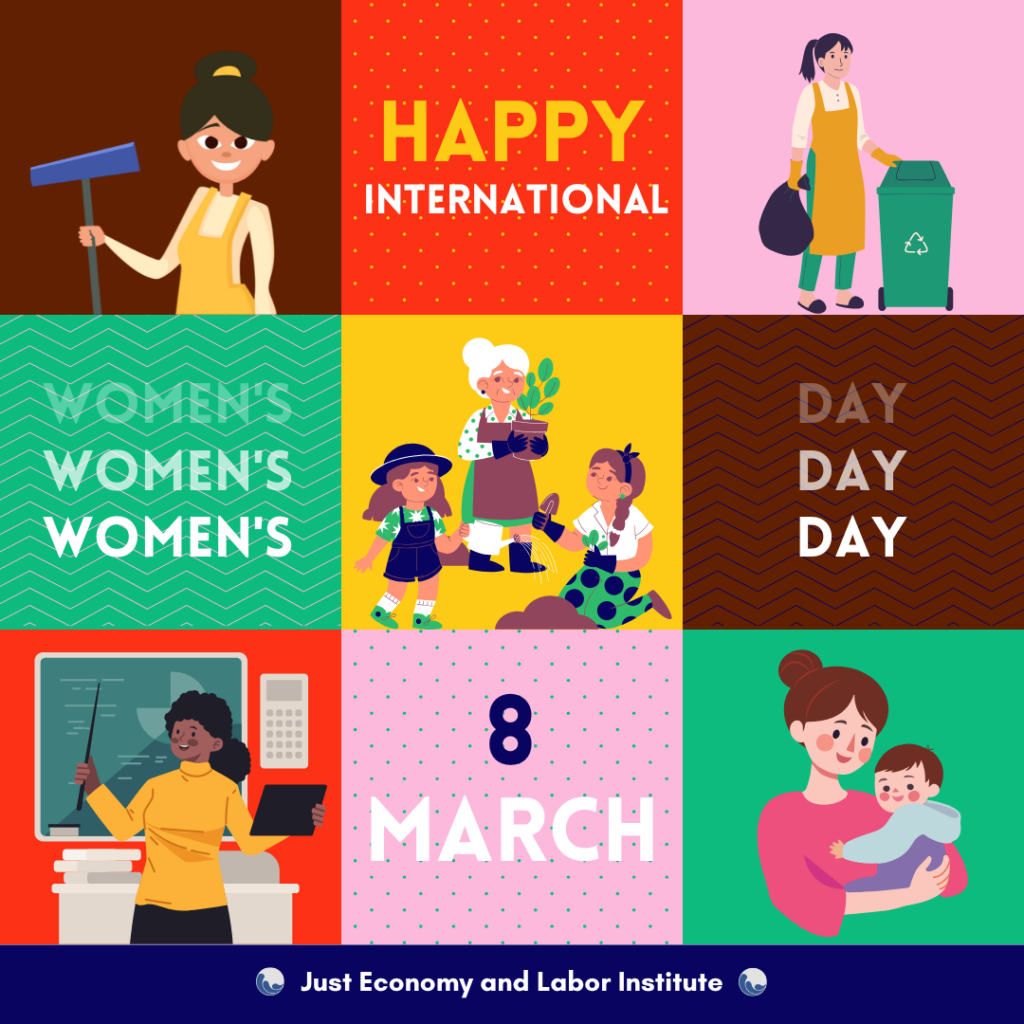
From the Past to the Road Ahead: Women’s Fight Continues
In 1977, the United Nations officially designated March 8 as “International Women’s Day” (IWD) to honor the global struggle of women for fair labor rights and equality in society. It is also a vital opportunity to point out the ongoing challenges women continue to face, whether it’s sexual oppression, harassment, gender discrimination, or inequality. While IWD has only been officially celebrated for 48 years, its roots trace back long before the 20th century.
The origin of International Women’s Day dates back to a protest by women workers in a textile factory in New York City on March 8, 1857. They demonstrated against the oppression they faced from employers through long working hours, unfair wages, and poor working conditions. This protest sparked a movement that spread throughout the United States and Europe. In 1910, Clara Zetkin, a German socialist and activist, led the movement calling for a reduction in working hours to eight hours per day. In the same year, during the second International Conference of Working Women in Copenhagen, Denmark, the idea of establishing March 8 as International Women’s Day was adopted. This day was meant to commemorate the labor movement of women and to mark the beginning of labor protection laws.
Today, International Women’s Day has become an important observance in many countries. In Russia, for example, it is a national holiday, and women are often given flowers or gifts as a token of appreciation for their roles in society, whether in the family, school, or workplace. In many countries, the day is also a significant occasion for campaigns advocating for gender equality.
Currently, policies for women are being supported through international cooperation and global movements aimed at enhancing rights, reducing inequality, and promoting gender equality. One such initiative is the Convention on the Elimination of All Forms of Discrimination Against Women (CEDAW), which was adopted by the United Nations in 1979. It obligates state parties to take measures to address gender discrimination in all aspects of life. Additionally, global campaigns like the #MeToo Movement have provided a platform for women to share their experiences of sexual harassment, and HeForShe encourages men to actively participate in promoting gender equality.
Policies in each country may vary depending on social and legal contexts, but they all aim for the same goal: achieving greater equality in rights and opportunities.
In several countries, such as Japan, South Korea, Indonesia, and Taiwan, there are policies for “Menstrual Leave,” which allow female workers to take time off when they experience severe menstrual pain without having their salary deducted or losing their leave benefits. Menstrual pain and other related symptoms are considered illnesses that impact a woman’s ability to work. In Indonesia, Article 81 of the Labor Law grants two days of leave per month, while Taiwan’s Act of Gender Equality in Employment provides three days of menstrual leave per year.
Another progressive policy is the “menstrual products tax-exempt,” aimed at reducing the financial burden on women and making essential hygiene products such as sanitary pads and tampons more accessible. These products are often expensive and necessary every month, which can significantly impact women, especially low-income women workers. Several countries, including the United Kingdom, Canada, and Kenya, have already removed taxes on menstrual products.
In addition to policies for women, policies related to mothers and children play a crucial role in enhancing the rights of women who are building families. Women workers often face the pressure of choosing between their careers and their families. Many countries have introduced “Parental Leave,” which helps balance work and family responsibilities. Adequate maternity leave not only promotes the health of mothers and children but also allows fathers to participate in early childcare, reducing the burden of caregiving that often falls solely on mothers. In Scandinavian countries with strong welfare systems, such as Sweden and Norway, the Parental Leave system allows both parents to take extended leave with financial support from the government. Japan also offers paternity leave of up to one year, which has contributed to shifting the cultural expectation that child-rearing is solely the mother’s responsibility. These policies also enable workers to return to their jobs more effectively, while reducing gender inequality in the workplace.
In Thailand, there are still many issues that need further advocacy. For instance, maternity leave is still limited to just 90 days, with employers only responsible for paying wages for 45 days, while the rest is covered by social security. This policy fails to cover more than 20 million workers in the informal sector. To this day, the Thai women’s movement continues to advocate for the extension of maternity leave to 180 days, not to mention the lack of support for childcare systems and paternity leave, which leaves the burden predominantly on women.
Menstrual leave is also absent from Thai policy. Many women still have to work while experiencing severe menstrual pain, and because there is no specific leave for this, they are forced to use sick leave instead. For some time, women workers in northern Thailand, both Thai and migrant workers, have united to push for the “Menstrual Leave” campaign, advocating for menstrual health to be recognized in the workplace.
Despite improvements in women’s rights and welfare over the years, societal structures and practices remain unjust, particularly the burden of unpaid care work, which primarily falls on women. Household chores and caregiving are fundamental to society but are not considered economically valuable labor. This results in women shouldering responsibilities both at home and in the workplace without proper support. Addressing this issue requires a shift in societal perspectives and the implementation of policies that make caregiving a shared responsibility.
It is important to understand that the journey towards gender equality and women’s rights is long and challenging. However, this struggle is not just the work of women alone, it must involve the entire society in order to create meaningful change towards a truly equal and just society.
เดือนมีนาคมมีวันสำคัญอย่าง “วันสตรีสากล” หรือ “วันแรงงานสตรีสากล” ซึ่งตรงกับวันที่ 8 มีนาคมของทุกปี สถาบันแรงงานและเศรษฐกิจที่เป็นธรรมในฐานะองค์กรที่สนับสนุนการเสริมพลังผู้หญิงเพื่อสร้างความเท่าเทียมทางเพศ ถือโอกาสนี้เพื่อระลึกถึงการต่อสู้และความเสียสละของแรงงานหญิงในอดีตที่ทำให้เราได้รับสิทธิและสวัสดิการที่เท่าเทียมในวันนี้
อย่างไรก็ตาม เมื่อวันที่ 28 มีนาคม ได้เกิดเหตุการณ์แผ่นดินไหวที่สร้างความสั่นสะเทือนในหลายพื้นที่ของประเทศไทย โดยเฉพาะกรุงเทพมหานคร ส่งผลกระทบต่อชีวิตความเป็นอยู่ของผู้คนจำนวนมาก การถล่มของตึกก่อสร้างในย่านจตุจักรทำให้มีผู้เสียชีวิต ผู้บาดเจ็บ และผู้สูญหายที่อยู่ใต้ซากอาคารจำนวนมาก สถาบันแรงงานและเศรษฐกิจที่เป็นธรรมขอแสดงความเสียใจอย่างสุดซึ้งต่อผู้ที่ได้รับผลกระทบจากเหตุการณ์นี้ เราหวังเป็นอย่างยิ่งว่าเหตุสะเทือนใจในครั้งนี้จะส่งสัญญานครั้งใหญ่ถึงการบังคับใช้มาตรฐานความปลอดภัยในสถานที่ทำงานอย่างเข้มงวด โดยเฉพาะในภาคส่วนที่มีความเสี่ยงสูง เช่น การก่อสร้าง
สำหรับงานของเราในเดือนนี้ เราได้เข้าร่วมเวทีเสวนาวาระวันสตรีสากลเพื่อส่งเสียงถึงสถานการณ์การทำงานของผู้หญิงในอุตสาหกรรมแพลตฟอร์ม ท่ามกลางนโยบายเศรษฐกิจของรัฐที่ทิ้งผู้หญิงคนทำงานและเด็กไว้ข้างหลัง นอกจากนี้ ยังได้นัดหารือกับตัวแทนไรเดอร์หญิงอย่างเข้มข้นเพื่อทำความเข้าใจร่าง พ.ร.บ. ส่งเสริมและคุ้มครองแรงงานอิสระ ซึ่งกำลังถูกผลักดันโดยกระทรวงแรงงาน เราขอชวนทุกคนย้อนกลับไปทำความรู้จักที่มาของวันสตรีสากล และนโยบายสตรีที่เกิดขึ้นแล้วในหลายประเทศทั่วโลกในเรื่องเล่ารายเดือน
งานของเรา
เวทีเสวนาวาระวันสตรีสากล
“นโยบายเศรษฐกิจของรัฐ: ทิ้งผู้หญิงคนทำงานและเด็กไว้ข้างหลัง”


เมื่อวันที่ 4 มีนาคม 2568 เจ้าหน้าที่สถาบันแรงงานและเศรษฐกิจที่เป็นธรรม พร้อมกับสุภาภรณ์ พันธ์ประสิทธิ์ แอดมินกลุ่มไรเดอร์เซ็นเตอร์ และรุ่งนิรันดร์ คำพิทูรย์ ตัวแทนสหกรณ์คนทำงานดูแล เข้าร่วมเวทีเสวนาวาระวันสตรีสากล ในหัวข้อ “นโยบายเศรษฐกิจของรัฐ: ทิ้งผู้หญิงคนทำงานและเด็กไว้ข้างหลัง” ณ หอประชุมสำนักกลางนักเรียนคริสเตียน กรุงเทพฯ
เวทีนี้จัดขึ้นเนื่องในวันสตรีสากลซึ่งตรงกับวันที่ 8 มีนาคม ของทุกปี โดยได้รวบรวมกลุ่มเครือข่ายภาคประชาสังคมด้านผู้หญิง แรงงาน และเด็ก เปิดเวทีอภิปรายเพื่อสร้างความตระหนักในประเด็นปัญหาที่ผู้หญิงคนทำงานกำลังเผชิญอยู่ ไม่ว่าจะเป็นการที่นโยบายของรัฐไม่ลงทุนกับเด็กและคน การถูกเลือกปฏิบัติ ความลำบากในการเข้าถึงกระบวนการยุติธรรม ผู้หญิงคนทำงานนอกระบบ ทำงานแพลตฟอร์ม และทำงานบ้านที่ไร้ความคุ้มครองทางสังคม
สุภาภรณ์ พันธ์ประสิทธิ์ แอดมินกลุ่มไรเดอร์เซ็นเตอร์ ได้ขึ้นอภิปรายในฐานะไรเดอร์หญิงและคนทำงานแพลตฟอร์มซึ่งถูกเรียกว่าเป็น “แรงงานอิสระ” ไม่มีสถานะลูกจ้าง ไม่มีสวัสดิการความคุ้มครองหรือกองทุนเงินทดแทน และได้เน้นย้ำว่าความสัมพันธ์ของแพลตฟอร์มกับไรเดอร์นั้นมีลักษณะเป็นนายจ้างอย่างชัดเจน แต่แพลตฟอร์มและรัฐบาลกลับหลีกเลี่ยงไม่ให้สถานะกลับไรเดอร์ ทำให้คนทำงานกลุ่มนี้ตกอยู่ในสภาวะเปราะบาง นอกจากนี้ กระทรวงแรงงานยังได้ผลักดัน ร่าง พ.ร.บ. ส่งเสริมและคุ้มครองแรงงานอิสระ โดยระบุให้ไรเดอร์เป็นอาชีพในกลุ่มนี้ ซึ่งจะทำให้ไรเดอร์หมดโอกาสได้รับความคุ้มครองตามกฎหมายแรงงานและการเข้าประกันสังคม มาตรา 33 และกองทุนเงินทดแทน ดังนั้นกลุ่มไรเดอร์จึงขอคัดค้านร่าง พ.ร.บ. ฉบับนี้ พร้อมทั้งขอแรงสนับสนุนจากทุกคน
เวทีเสวนานี้เปิดให้มีการแลกเปลี่ยนข้อปัญหาที่ขบวนการสตรียังคงดำเนินการผลักดันอยู่ในปัจจุบัน ไม่ว่าจะเป็นการจัดสรรงบประมาณของรัฐที่เข้าไม่ถึงปัญหาของเด็กและสตรี ร่วมถึงการบริหารจัดการส่วนท้องถิ่น ข้อเรียกร้องสำหรับผู้หญิง เช่น การลาคลอด 180 วัน การเพิ่มงบประมาณให้แม่และเด็ก สภาพการจ้างงานที่ไม่เอื้อต่อการสร้างครอบครัว การพัฒนาคุณภาพชีวิตสตรีพิการ และสิทธิความเท่าเทียมของสตรีชนเผ่าพื้นเมือง ก่อนจบงาน ผู้เข้าร่วมงานจึงได้อ่านแถลงการณ์ในวาระวันสตรีสากล 2568 เพื่อเรียกร้องถึงรัฐบาลร่วมกัน
อ่านแถลงการณ์ในวาระวันสตรีสากล 8 มีนาคม 2568 ของเครือข่ายผู้หญิงคนทำงานและเด็ก ที่นี่
JELI ร่วมเครือข่ายแรงงานและผู้ประกันตนเรียกร้องประกันสังคมโปร่งใส


เมื่อวันที่ 11 มีนาคม 2568 เจ้าหน้าที่สถาบันแรงงานและเศรษฐกิจที่เป็นธรรม ร่วมกับกลุ่มเครือข่ายแรงงานและผู้ประกันตนในระบบประกันสังคม เดินทางไปยังสำนักงานประกันสังคม สำนักงานใหญ่ จังหวัดนนทบุรี เพื่อติดตามการประชุมบอร์ดประกันสังคมซึ่งมีวาระพิจารณาที่สำคัญคือการคำนวณบำนาญชราภาพผู้ประกันตนสูตรใหม่ จากเหตุที่ผู้ประกันตนตามมาตรา 39 ที่เคยส่งมาตรา 33 มาแต่เดิม ได้รับผลกระทบจากสูตรการคำนวณที่ไม่เป็นธรรม ทำให้หลายคนได้รับบำนาญต่ำกว่าที่ควรจะได้รับ
ซึ่งการรวมตัวกันในครั้งนี้ นอกจากจะเพื่อรอรับฟังผลการพิจารณาวาระดังกล่าวแล้ว ยังมีการปราศรัยของกลุ่มเครือข่ายแรงงานถึงปัญหาต่างๆ ของสิทธิประกันสังคมและการบริหารงานของสำนักงานประกันสังคม ข้อเรียกร้องจากหลายกลุ่มแรงงานต้องการปฏิรูปให้กองทุนประกันสังคมเป็นองค์การมหาชน มีความเปิดเผย โปร่งใส และตรวจสอบได้ ให้สิทธิความคุ้มครองต่างๆ มีความเหมาะสมและตอบสนองต่อความต้องการของผู้ประกันตนจริง รวมถึงการเรียกร้องของกลุ่มไรเดอร์และแรงงานแพลตฟอร์มเพื่อการเข้าถึงสิทธิประกันสังคม มาตรา 33 ซึ่งมีนายจ้างเป็นผู้ร่วมรับผิดชอบ และกองทุนเงินทดแทนช่วยเหลือไรเดอร์ที่ประสบอุบัติเหตุหรือเสียชีวิตจากการทำงาน
JELI หารือแกนนำไรเดอร์ทำความเข้าใจ พ.ร.บ. ส่งเสริมและคุ้มครองแรงงานอิสระ

เมื่อวันที่ 19 มีนาคม 2568 เจ้าหน้าที่สถาบันแรงงานและเศรษฐกิจที่เป็นธรรม นัดหมายหารือกลุ่มย่อยร่วมกับ 4 แกนนำไรเดอร์หญิงกลุ่ม Rider Center ซึ่งเป็นตัวแทนจากหลายพื้นที่ในกรุงเทพฯ เพื่อทำความเข้าใจและรับฟังความคิดเห็นต่อร่าง พ.ร.บ. ส่งเสริมและคุ้มครองแรงงานอิสระ ที่อยู่ระหว่างการผลักดันโดยกระทรวงแรงงานซึ่งจะส่งผลกระทบโดยตรงต่อผู้ประกอบอาชีพไรเดอร์ทั่วประเทศ
ตัวแทนไรเดอร์ได้ร่วมกันหารือถึงข้อข้องใจที่เกิดจาก พ.ร.บ. ฉบับนี้ ซึ่งยังคงมีความคลุมเครือไม่ชัดเจนเกี่ยวกับการนิยามแรงงานกึ่งอิสระ โครงสร้างของคณะกรรมการส่งเสริมและคุ้มครองแรงงานอิสระ หรือ พ.ร.บ. ไม่ได้ส่งเสริมระบบเจรจาต่อรองอย่างแท้จริง จากการหารือทำให้สรุปได้ว่า ร่าง พ.ร.บ. ส่งเสริมและคุ้มครองแรงงานอิสระ ไม่ได้คุ้มครองไรเดอร์อย่างแท้จริงและจะเป็นการปิดโอกาสในการเรียกร้องสิทธิที่ไรเดอร์ควรได้รับ หากร่าง พ.ร.บ. ฉบับนี้ผ่าน เท่ากับเป็นการรับรองว่าไรเดอร์ไม่ใช่ “ลูกจ้าง” ของแพลตฟอร์ม แต่เป็นเพียงแรงงานอิสระ และไรเดอร์จะไม่มีสิทธิรวมตัวเจรจาต่อรองกับแพลตฟอร์มทั้งเรื่องสภาพการจ้าง ค่ารอบ หรือสวัสดิการ รวมถึงไม่มีสิทธิในการเข้าถึงประกันสังคม มาตรา 33 และกองทุนเงินทดแทนด้วย ทั้งนี้ แกนนำไรเดอร์จะได้นำรายละเอียดดังกล่าวไปขยายผลกับเพื่อนสมาชิกเพื่อทำความเข้าใจและหาข้อสรุปร่วมกันในรณรงค์คัดค้านร่าง พ.ร.บ. ฉบับนี้ต่อไป
กิจกรรมแบ่งปันประสบการณ์เพื่อเพิ่มทักษะและความเชี่ยวชาญของหมอนวดไทย


เมื่อวันที่ 24 มีนาคม 2568 ที่ผ่านมา สหกรณ์หมอนวด “Thai Therapy Spa at Home” ได้จัดการแลกเปลี่ยนประสบการณ์การนวดโดยจุดมุ่งหมายเพื่อให้หมอนวดได้แบ่งปันประสบการณ์และเทคนิคในการนวดเพื่อเพิ่มทักษะและความเชี่ยวชาญ
หยก หนึ่งในแกนนำแลผู้ก่อตั้งสหกรณ์หมอนวดได้บอกกับเพื่อนๆ ว่า หลักการนวดแผนไทยหรือนวดไทยต้องระวังและคำนึงถึงความปลอดภัยของลูกค้าเป็นสำคัญ หมอนวดต้องสอบถามลูกค้าก่อนนวดทุกครั้งว่ามีโรคประจำตัวหรือไม่ เพราะมีโรคต้องห้ามนวดเด็ดขาด เช่น โรคหลอดเลือดสมอง โรคสะเก็ดเงิน กลากเกลื้อน วัณโรค มะเร็ง เบาหวาน แม้ช่วงหลังจะผ่อนปรนการนวดให้ผู้ป่วยมะเร็งและเบาหวานเพื่อให้ผู้ป่วยได้ผ่อนคลายจากการเจ็บปวดของโรค แต่ก็ต้องระมัดระวังในการนวดเป็นอย่างมาก ลูกค้าที่เพิ่งรับการผ่าตัดหรือลูกค้าที่ประสบอุบัติเหตุมีบาดแผลยังไม่หายดีก็อยู่ในกลุ่มห้ามนวด
ในช่วงหลังมีคนท้องต้องการนวดเพิ่มมากขึ้น “ดี” หนึ่งในแกนนำและอดีตหมอนวดกายภาพบำบัดในโรงพยาบาลได้ให้คำอธิบายเพิ่มเติมว่า การนวดคนท้องสามารถทำได้แต่ต้องไม่นวดจุดฝ่าเท้าที่เป็นศูนย์รวมของอวัยวะต่างๆในร่างกาย และต้องไม่กดนวดจุดเปิดปิดประตูลม (ต้นขาด้านใน) การนวดคนท้องจะเน้นการนวดเพื่อผ่อนคลายทั้งทางร่างกายและทางจิตใจ เนื่องจากคนท้องส่วนใหญ่มักมีจิตใจที่อ่อนไหวมีความกังวลสูงกับภาวะตั้งครรภ์
นอกจากนั้นแล้วหมอนวดไม่เพียงมีความรู้ความสามารถในวิชาชีพของตนเองเท่านั้น ต้องมีเทคนิคและวิธีการนวดที่เหมาะสมกับสุขภาพและความต้องการของลูกค้า หมอนวดต้องมีจิตวิทยาควบคู่ไปด้วย ต้องมองโลกเชิงบวก เก็บอารมณ์อดทนอดกลั้น เพราะบางครั้งเมื่อเจอลูกค้าที่มีอารมณ์แปรปรวน จะต้องรับมือด้วยความอดทน แสดงท่าทีอ่อนโยนและเป็นมิตรเพื่อให้เขารู้สึกผ่อนคลายสบายใจ หมอนวดไทยจึงไม่ใช่เพียงศาสตร์ทางร่างกายอย่างเดียวต้องรู้การดูแลจิตใจไปด้วย “แอนนา” แกนนำสหกรณ์หมอนวดอีกคนได้แสดงทัศนะเพิ่มเติมให้เพื่อนรับฟัง
หลังการแลกเปลี่ยนความรู้และเทคนิควิธีการในการนวด พวกเธอได้เพิ่มทักษะการนวดให้แก่กันคือการลงมือปฏิบัติจริงด้วยการนวดจับเส้นว่าต่างๆ ในร่างกายเพื่อเพิ่มทักษะให้แก่กันและกัน แม้หมอนวดหลายคนจะมีประสบการณ์การนวดมานานหลายปีแต่การแลกเปลี่ยนและแบ่งปันประสบการณ์ให้แก่กันในครั้งนี้ได้สร้างคุณค่าทางจิตใจให้กับพวกเธออย่างมาก การได้มาเจอและแลกเปลี่ยนกันทำให้เกิดความเชื่อมั่นและภูมิใจในอาชีพของตนเอง จึงควรจัดเวทีแบบนี้อย่างต่อเนื่องเพื่อให้เกิดการถ่ายทอดประสบการณ์และเพิ่มทักษะให้แก่กัน “อรุณ” หนึ่งในแกนนำหมอนวดกล่าว
ข่าวสำคัญ
แกนนำไรเดอร์จังหวัดกระบี่ สมาคมไรเดอร์ภาคใต้ ติดแผ่นป้ายข้อความบนกล่องใส่อาหาร “ไรเดอร์ไม่เอา พ.ร.บ. แรงงานอิสระ” เพื่อรณรงค์คัดค้านร่าง พ.ร.บ. ส่งเสริมและคุ้มครองแรงงานอิสระ ที่จัดให้ไรเดอร์เป็นแรงงานกึ่งอิสระซึ่งขัดต่อสภาพการทำงานแบบลูกจ้างของไรเดอร์ อ่านที่: สมาคมไรเดอร์ภาคใต้
บอร์ดประกันสังคม เห็นพ้อง ปรับสูตรคำนวณบำนาญผู้ประกันตน ตาม ‘สูตรแคร์’ เพิ่มเงินให้ผู้ประกันตนที่เกษียณไปแล้ว รับบำนาญเดิมกว่า 800,000 คน ได้ด้วย พร้อมเดินหน้าทำประชาพิจารณ์ใน 90 วัน ก่อนเสนอแก้กฎหมาย อ่านที่: The Active
เกิดเหตุแผ่นดินไหวรุนแรงขนาด 8.2 เมื่อวันที่ 28 มีนาคม โดยมีศูนย์กลางที่ประเทศเมียนมา ส่งแรงสะเทือนถึงประเทศไทยหลายพื้นที่ รวมถึงกรุงเทพมหานคร และเกิดอาฟเตอร์ช็อกอย่างน้อย 44 ครั้ง ขนาดความรุนแรงตั้งแต่ขนาด 3.1 – 5.5 อ่านที่: บีบีซีไทย
ผลการลงมติไม่ไว้วางใจ 2568: ที่ประชุมสภาผู้แทนราษฎรโหวตลงมติไว้วางใจให้ “แพทองธาร ชินวัตร” ทำหน้าที่นายกรัฐมนตรีต่อไป ด้วยเสียงโหวต 319 ต่อ 162 เสียง งดออกเสียง 7 เสียง อ่านที่: ไทยรัฐ
เรื่องเล่ารายเดือน

จากการต่อสู้ของผู้หญิงในอดีตสู่ความเปลี่ยนแปลงที่ยังต้องเดินต่อ
ในปี 1977 องค์การสหประชาชาติกำหนดอย่างเป็นทางการให้วันที่ 8 มีนาคมของทุกปี เป็น “วันสตรีสากล” (International Women’s Day: IWD) เพื่อระลึกถึงการต่อสู้ของผู้หญิงทั่วโลกเพื่อสิทธิแรงงานที่เป็นธรรมและความเท่าเทียมกันในสังคม ทั้งยังเป็นโอกาสสำคัญที่สะท้อนให้เห็นถึงปัญหาที่ผู้หญิงยังคงต้องเผชิญ ทั้งการกดขี่ทางเพศ การคุกคาม การเหยียดเพศและเลือกปฏิบัติ แต่ทว่าวันสตรีสากลที่ไม่ได้เกิดขึ้นมาเป็นระยะเวลาแค่ 48 ปีเท่านั้น แต่มีรากฐานมาอย่างยาวนานตั้งแต่ช่วงก่อนศตวรรษที่ 20
“วันสตรีสากล” มีต้นกำเนิดมาจากการต่อสู้ของแรงงานหญิงในโรงงานทอผ้าที่เมืองนิวยอร์ก สหรัฐอเมริกา เมื่อวันที่ 8 มีนาคม 1857 เกิดการชุมนุมประท้วงการถูกกดขี่จากนายจ้างด้วยชั่วโมงการทำงานที่ยาวนาน ค่าจ้างและสภาพการทำงานที่ไม่เป็นธรรม ทำให้หลังจากนั้นเกิดการขยายแนวคิดและจุดประกายไปทั่วทั้งอเมริกาและยุโรป จนกระทั่ง “คลาร่า เซทคิน” นักสังคมนิยมและนักเคลื่อนไหวชาวเยอรมัน ผู้นำขบวนนัดหยุดงานเรียกร้องให้นายจ้างลดเวลาการทำงานเหลือ 8 ชั่วโมง ซึ่งได้รับแรงสนับสนุนจากผู้หญิงทั่วโลก ในปี 1910 ที่ประชุมของสมัชชาสตรีสังคมนิยม ณ เมืองโคเปนเฮเกน ประเทศเดนมาร์ก ได้รับรองข้อเสนอของคลาร่าให้วันที่ 8 มีนาคม เป็นวันสตรีสากล เพื่อระลึกถึงการเคลื่อนไหวของแรงงานหญิงตั้งแต่อดีตที่กลายเป็นจุดเริ่มต้นของกฎหมายคุ้มครองแรงงาน
ปัจจุบัน วันสตรีสากลกลายเป็นวาระสำคัญในหลายประเทศ เช่น ประเทศรัสเซีย ที่กำหนดให้วันสตรีสากลของทุกปีเป็นวันหยุดราชการ ในทางปฏิบัติ ผู้หญิงจะได้รับดอกไม้หรือของขวัญเพื่อแสดงถึงความสำคัญของบทบาทของผู้หญิงในสังคมทุกบริบทไม่ว่าจะเป็นครอบครัว โรงเรียน หรือที่ทำงาน และในหลายๆ ประเทศ วันสตรีสากลก็เป็นโอกาสสำคัญในการจัดกิจกรรมรณรงค์เพื่อความเท่าเทียมทางเพศ
ทุกวันนี้นโยบายสำหรับผู้หญิงได้รับการสนับสนุนผ่านความร่วมมือระหว่างประเทศและการเคลื่อนไหวระดับโลกที่ต้องการยกระดับสิทธิ ลดความเหลื่อมล้ำ และส่งเสริมความเท่าเทียมทางเพศ เช่น อนุสัญญาว่าด้วยการขจัดการเลือกปฏิบัติทางเชื้อชาติและเพศ (CEDAW) ซึ่งสหประชาชาติรับรองในปี 1979 กำหนดให้รัฐภาคีดำเนินมาตรการเพื่อแก้ไขการเลือกปฏิบัติทางเพศในทุกมิติของชีวิต นอกจากนี้ ยังมีแคมเปญระดับโลก เช่น #MeToo Movement ที่เปิดพื้นที่ให้ผู้หญิงพูดถึงประสบการณ์การถูกคุกคามทางเพศ หรือ HeForShe ที่สนับสนุนให้ผู้ชายมีบทบาทในการส่งเสริมความเท่าเทียม
นโยบายในแต่ละประเทศอาจแตกต่างกันไปตามบริบททางสังคมและกฎหมาย แต่ล้วนมุ่งไปสู่เป้าหมายเดียวกันคือสิทธิและโอกาสที่เท่าเทียมกันมากขึ้น
ในหลายประเทศ เช่น ญี่ปุ่น เกาหลีใต้ อินโดนีเซีย และไต้หวัน มีนโยบาย “วันลาประจำเดือน” (Menstrual Leave) ซึ่งอนุญาตให้แรงงานหญิงลาหยุดได้เมื่อมีอาการปวดประจำเดือนรุนแรง โดยไม่ถูกหักเงินเดือนหรือเสียสิทธิวันลา เพราะการปวดท้องและอาการอื่นๆ จากการมีประจำเดือนถือเป็นการเจ็บป่วยซึ่งส่งผลต่อการทำงาน ในอินโดนีเซีย กฎหมายแรงงาน มาตรา 81 ให้สิทธิลาได้ 2 วันต่อเดือน ส่วนไต้หวันก็มีกฎหมายความเสมอภาคทางเพศที่ให้สิทธิลาได้ 3 วันต่อปี
นโยบาย “ยกเลิกภาษีผลิตภัณฑ์ประจำเดือน” ก็เป็นอีกหนึ่งความก้าวหน้าในการลดภาระค่าใช้จ่ายสำหรับผู้หญิงและทำให้สินค้าสุขอนามัยของผู้หญิงเข้าถึงได้ง่ายขึ้น เช่น ผ้าอนามัยและแผ่นอนามัย ซึ่งมีราคาสูงและมีความจำเป็นในการบริโภคทุกเดือน ส่งผลกระทบผู้หญิงทั่วโลก โดยเฉพาะแรงงานหญิงที่มีรายได้น้อย ปัจจุบัน มีหลายประเทศที่ยกเว้นภาษีผลิตภัณฑ์ประจำเดือนแล้ว เช่น สหราชอาณาจักร แคนาดา เคนย่า เป็นต้น
นอกจากนโยบายสำหรับผู้หญิงแล้ว นโยบายเกี่ยวกับแม่และเด็กก็มีความสำคัญในการยกระดับสิทธิของผู้หญิงที่กำลังสร้างครอบครัว โดยเฉพาะแรงงานหญิงที่มักถูกบีบให้ต้องเลือกระหว่างอาชีพและครอบครัว ปัจจุบันหลายประเทศได้มีการนำเสนอ “วันลาสำหรับพ่อ” หรือ “วันลาคู่” (Parental Leave) เพื่อช่วยสร้างสมดุลระหว่างการทำงานและการดูแลครอบครัว จำนวนวันลาคลอดที่เหมาะสมไม่เพียงแต่ช่วยส่งเสริมสุขภาพของแม่และเด็ก แต่ยังเปิดโอกาสให้พ่อมีส่วนร่วมในการดูแลลูกตั้งแต่ช่วงแรกของชีวิตด้วย ลดการแบ่งหน้าที่การดูแลเด็กที่มักตกอยู่กับแม่ฝ่ายเดียว
ในประเทศแถบสแกนดิเนเวียที่มีรัฐสวัสดิการที่เข้มแข็ง เช่น สวีเดนและนอร์เวย์ ระบบ Parental Leave จะให้สิทธิพ่อและแม่ลาร่วมกันได้นานหลายเดือน พร้อมทั้งได้รับเงินสนับสนุนจากรัฐ ญี่ปุ่นเองก็ให้พ่อสามารถลางานได้นานถึงหนึ่งปี ซึ่งช่วยเปลี่ยนแปลงวัฒนธรรมการเลี้ยงดูบุตรจากที่เคยเป็นหน้าที่ของแม่ฝ่ายเดียว การมีนโยบายเหล่านี้ไม่เพียงแต่ช่วยให้เด็กได้รับการดูแลที่ดีขึ้น แต่ยังช่วยให้พนักงานสามารถกลับไปทำงานได้อย่างมีประสิทธิภาพ และลดความเหลื่อมล้ำทางเพศในที่ทำงานด้วย
สำหรับประเทศไทย แม้ว่าสิทธิของผู้หญิงทำงานจะมีพัฒนาการมาหลายทศวรรษ แต่ยังมีหลายประเด็นที่ยังต้องผลักดัน เช่น วันลาคลอดที่ยังจำกัดเพียง 90 วัน โดยที่นายจ้างรับผิดชอบค่าจ้างเพียง 45 วัน ส่วนที่เหลือมาจากประกันสังคม ซึ่งยังไม่ครอบคลุมแรงงานในระบบไม่เป็นทางการกว่า 20 ล้านคน ซึ่งประเด็นนี้ เครือข่ายขบวนการสตรีไทยก็ได้เดินหน้าต่อสู้อย่างต่อเนื่องเพื่อขยายวันลาคลอดเป็น 180 วัน นอกจากนี้ ยังขาดการสนับสนุนเรื่องระบบดูแลเด็กและวันลาคู่สำหรับพ่อ ทำให้ภาระส่วนใหญ่ยังคงตกอยู่กับผู้หญิง
อีกประเด็นที่ยังไม่มีการรับรองในนโยบายของไทยคือ วันลาประจำเดือน ผู้หญิงจำนวนมากยังต้องไปทำงานทั้งๆ เผชิญกับอาการเจ็บป่วยรุนแรง และเนื่องจากไม่มีสิทธิลาโดยเฉพาะ จึงต้องใช้วันลาป่วยแทน ในช่วงที่ผ่านมา กลุ่มแรงงานหญิงในภาคเหนือ ทั้งแรงงานไทยและแรงงานข้ามชาติ ได้รวมตัวกันผลักดันแคมเปญ “เมนส์มาลาได้” เพื่อเรียกร้องให้อาการเจ็บป่วยของผู้มีประจำเดือนได้รับการยอมรับในที่ทำงาน
แม้ว่าสิทธิและสวัสดิการของผู้หญิงจะมีพัฒนาการขึ้นในช่วงหลายปีที่ผ่านมา แต่โครงสร้างทางสังคมและวิถีปฏิบัติหลายอย่างก็ยังคงไม่เป็นธรรม โดยเฉพาะภาระงานบ้าน ซึ่งถือเป็น unpaid care work หรืองานดูแลที่ไม่ได้ค่าจ้างที่ยังตกอยู่กับผู้หญิงเป็นหลัก การทำงานบ้านและดูแลครอบครัวเป็นรากฐานสำคัญของสังคม แต่กลับไม่ถูกนับเป็นแรงงานที่มีมูลค่าทางเศรษฐกิจ ทำให้ผู้หญิงต้องรับภาระทั้งในบ้านและในที่ทำงาน โดยไม่ได้รับการสนับสนุนอย่างเหมาะสม การแก้ไขปัญหานี้จึงต้องเริ่มจากการเปลี่ยนมุมมองของสังคม และผลักดันนโยบายที่ทำให้ภาระเหล่านี้เป็นความรับผิดชอบร่วมกัน
เราต้องเข้าใจว่า การเดินทางเรียกร้องสิทธิและความเท่าเทียมทางเพศยังคงยาวไกลและท้าทายอยู่ แต่การต่อสู้ไม่ได้เป็นเพียงขบวนการของสตรีเท่านั้น แต่ต้องเป็นการร่วมมือของสังคมทั้งหมด เพื่อสร้างการเปลี่ยนแปลงทางความคิดและสังคมที่เท่าเทียมกันอย่างแท้จริง
อ้างอิง
- Global Citizen. (2023). What Is the Tampon Tax? Everything You Need to Know About the Campaign to End Period Poverty. https://www.globalcitizen.org/en/content/tampon-tax-explained-definition-facts-statistics
- World Economic Forum. (2023). The Origins of International Women’s Day and How It Became a Global Celebration. https://www.weforum.org/stories/2023/03/origins-international-womens-day-holiday
